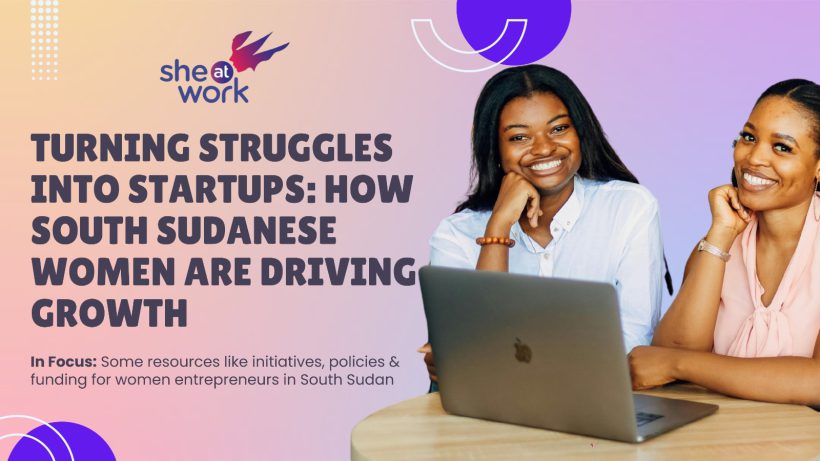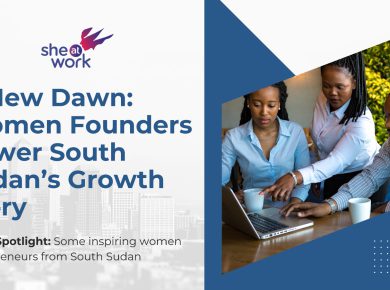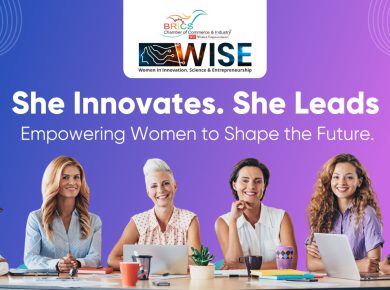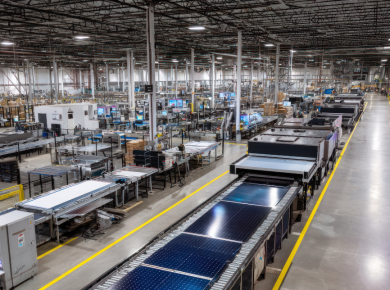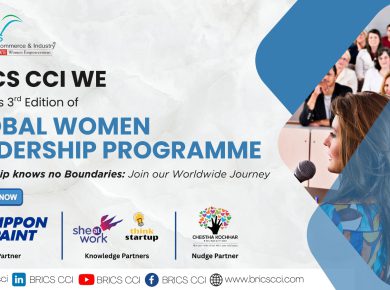In Focus: Some resources like initiatives, policies & funding for women entrepreneurs in South Sudan
#SouthSudanWomen #WomenEntrepreneurs #BreakingBarriers #YoungNationBigDreams #EmpowerHer #WomenLeadGrowth #ResilientEntrepreneurs #BusinessQueens #SouthSudanRising #SheMeansBusiness
South Sudan, often called “The World’s Youngest Nation,” has been forging its identity since it gained independence in 2011. Amidst the challenges of rebuilding, one powerful driver of change has been the country’s women entrepreneurs. These women, though often operating in difficult circumstances, are proving to be a resilient force that is shaping South Sudan’s economic future.
Women entrepreneurs in South Sudan face a unique set of hurdles – limited access to finance, inadequate education and training opportunities & persistent gender discrimination. Many find it difficult to secure start-up capital or grow their businesses due to restrictive lending practices and lack of collateral. Cultural and societal norms continue to influence the kinds of businesses women can pursue, often confining them to traditionally “acceptable” roles. Despite these barriers, women remain determined, turning challenges into opportunities with persistence, creativity, and courage.
South Sudan’s Business Queens: Building a Nation from the Ground Up
Recognizing their potential, both national and international associations are stepping up with initiatives designed to empower them. Programmes like the Women Entrepreneurs Boot Camp, the Women Entrepreneurial Opportunity Facility (WEOF), and the South Sudan Women’s Social and Economic Empowerment Project (SSWSEEP) provide training, mentorship, access to markets & loans too. Community-driven efforts are creating platforms for women to showcase their products and connect with buyers.
As South Sudan continues its journey toward stability and growth, empowering women through entrepreneurship is more than a development goal – it is an economic necessity. These enterprising women are not only building businesses but also laying the foundation for a stronger, more inclusive future for the nation.
Let us now shine a light on some resources available like initiatives, policies & funding for women entrepreneurs in South Sudan.
- Women Entrepreneurial Opportunity Facility (WEOF)
Providing training, business development support and financing, this is a facility under the SSWSEEP – to help women entrepreneurs grow their businesses.
This is a newly launched Women’s Entrepreneurial Opportunity Facility (#WEOF) in February 2025. It aims to address the financial barriers faced by women entrepreneurs, providing them with the resources & support necessary to grow their businesses, create jobs, & contribute to South Sudan’s economic development and progress.
In 2014, Goldman Sachs 10,000 Women partnered with International Finance Corporation (IFC) – to establish the Women Entrepreneurs Opportunity Facility (WEOF), the first-of-its-kind venture to support entrepreneurs and SMEs in developing countries and emerging markets around the world.
https://www.goldmansachs.com/community-impact/10000-women/women-entrepreneurs-opportunity-facility
- South Sudan Women’s Social and Economic Empowerment Project (SSWSEEP)
SSWSEEP is a broader project that aims to increase women’s access – to livelihood and entrepreneurial services.
In June 2023, women in 10 states and 2 administrative areas in South Sudan had their livelihoods enhanced following the launch of the World Bank-funded South Sudan Women Social Economic Empowerment Project (SSWSEEP) that was implemented by UN Women. Overall, this project aims to empower 261, 000 women including adolescent girls and youth.
Looking at it historically, negative social norms and practices have hindered the progress of women and young girls in South Sudan. And they are currently undergoing challenges due to – climate change and inadequate opportunities for empowerment. The 4-year SSWSEEP project provides women and girls access to livelihood through the construction of five Women Economic Empowerment Centers – that will enhance life skills training, including literacy, support to value chain development and second chance education.
In South Sudan, women own 63% of the SMEs and only 5% have access to credit and loans, which remains a key barrier to the growth and development of women-led enterprises. In fact, the project builds on and aims at scaling up the gains already made by South Sudan women, with the support of UN Women and its partners.
- International Trade Centre (ITC) South Sudan Jobs Creation and Trade Development Project
They support youth and women in the agri-business sector – with training, access to finance & trade fairs to enhance their market access.
The origin was a technical assistance request of the Government of South Sudan to the International Trade Centre. the specific objectives are – improving the competitiveness of micro, small and medium-sized enterprises (MSMEs) and increasing employment opportunities for the South Sudanese labour force – focusing on youth and women. Plus, it aims to provide an integrated and holistic assistance for the development of MSMEs in the fruits and vegetables value chains – to create quick-win economic & employment opportunities for South Sudanese population, targeted under the project.
It steps up to address the main challenges of the fruits and vegetables subsector along the value chains – by improving production, processing and handling practices; by building capacities of MSMEs to comply with mandatory market requirements and standards for enhanced access to markets; and enhancing human skills as well as strengthening producer cooperatives. Thus, it also addresses the employment problems of youth and women by building entrepreneurship and business management capacities and implementing innovative schemes – to facilitate access to finance for youth entrepreneurs and youth-owned businesses.
The project has an overall objective of improving the livelihoods of targeted South Sudanese populations – through the creation of jobs and income.
https://www.intracen.org/our-work/projects/south-sudan-jobs-creation-and-trade-development
- Youth and Women Agribusiness Entrepreneurship Programme (YWAE)
Here the focus is on creating and supporting agribusinesses, particularly in groundnut, sorghum, moringa, fisheries, honey & cassava value chains. This includes – providing access to finance, demand-driven rent-to-own schemes for equipment & loans.
YWAE aims to create new agri-businesses and support existing ones for women and youth in South Sudan. By improving their access to finance and markets, farmers can move up from subsistence to commercial levels. The focus is on groundnut, sorghum, moringa, fisheries, honey and cassava value chains.
SPARK partners with Premium Agro-hub, local business skills training consultants, to develop training materials for and to give training to 350 illiterate entrepreneurs. Demand-driven rent-to-own schemes have been utilized for beehives and fishing nets, and in-kind loans are provided to SMEs, such as seeds for groundnuts or moringa seedlings.
Moringa, being highly nutritious and thus able to contribute to food security, was selected as value chain for a business plan competition. Selected businesses will receive support at the SPARK business incubator, where entrepreneurs have the opportunity to utilize processing machines and coaching services – to start their agri-businesses.
https://spark.ngo/programme/youth-and-women-agribusiness-entrepreneurship-programme-ywae
- Women and Youth Leadership Initiative Programme
The Women and Youth Leadership Programme was officially launched in Juba, South Sudan, in June 2023 – to empower young people, particularly women, with professional skills, career guidance, mentorship & employment opportunities. This initiative, spearheaded by the Vice President’s Office in partnership with the UNDP and other organizations – aims to address South Sudan’s skills gap and foster economic and political inclusivity. By providing hands-on experience through internships and training, this programme seeks to create a new generation of empowered leaders to contribute to the nation’s development.
UN Women South Sudan and UNDP South Sudan have launched a three-year Women Political Participation and Leadership during South Sudan Transition project is funded by the Peace Building Fund. The project, implemented in Juba, Malakal and Pibor has technical leadership and strategic oversight provided by the South Sudan Ministry of Peace Building.
This programme provides structured paid internships, career mentorship & skills training for young women and men to build their professional and leadership capacities.
The initiative aims to cultivate productive leaders, develop role models, generate employment & ultimately contribute to the nation’s progress by fostering leadership, inclusivity, and economic empowerment.
https://africa.unwomen.org/en/stories/news/2023/06/womens-leadership-and-political-participation-project-launched
- Women Entrepreneurial Opportunity Facility Project
South Sudan launched a 10 million US dollar Women Entrepreneurial Opportunity Facility project – to empower women-led small and medium enterprises in Juba.
Launched in February 2025, the project offers women with access to financial support, training, and resources to enable them to grow their businesses.
The two-year Ministry of Gender, Child and Social Welfare led project, funded by the World Bank, aims to equip women with business skills, financial skills, technical advisory services, and business financing to grow their businesses.
https://www.sudanspost.com/south-sudan-launches-10-million-project-for-women-entrepreneurs/
- Southern Sudan Women Entrepreneurs Association
In 2010, a group of women who attended entrepreneurship skills and microfinance training formed a private association called – “Southern Sudan Women Entrepreneurs Association” which after the independence of South Sudan became “South Sudan Women Entrepreneurs Association” (The World Bank, 2011).
The association is concerned with the empowerment of women through entrepreneurship, capacity building, networking & business development. Since the formation of this association, many women became members and some got training and grants. In the same time, progress was also made by women entrepreneurs.
Clause 16 of South Sudan’s Transitional Constitution 2011 clearly states that women have rights to own property, however cultural practices are contrary to this part of the constitution, affecting women’s ability to start or be involved in businesses. For one to become a successful entrepreneur, you need to be self-sufficient and financially stable, but because of traditions that believe women are meant to stay at home to look after children and do only domestic chores, many women are dependent on their spouses. This was a real challenge especially for ambitious women, who want to be self-reliant. Because almost all disputes in South Sudan were dealt with in customary courts, there was a need for a review of the formal and customary legal system to protect the rights of women as espoused in international law (The Institute for Justice and Reconciliation, Policy Brief, July 2013).
South Sudan women entrepreneurs are very centred and ambitious. They have aspirations to own banks, companies, and industries; to have increased access to credit facilities through Savings and Credit Cooperatives (SACCOs), to see more women participating in the East African Common Market and other international economic blocks, to be treated in a respectful and dignified manner, and to compete favourably with other women entrepreneurs from the region and the continent (South Sudan National Women’s Strategy September, 2016).
There is already some support for women entrepreneurs within the country, both at the national and grassroots levels. Humanitarian and development organizations in South Sudan have programmes – for women’s economic empowerment and entrepreneurship. For example, in Yambio, Masaia market was rehabilitated by UNDP and UN Women so that women entrepreneurs selling fruits and vegetables would have proper and hygienic facilities for their businesses (UNV, 2019). In this intervention more than 88 women beneficiaries were provided with additional entrepreneurial and business skills so they can provide better customer service, save for, invest in, and even expand their businesses.
However, a lot more needs to be done by the government and its development partners in order for women’s aspirations of competing in regional and international markets to be realized.
The Revitalized Agreement on the Resolution of Conflict in South Sudan which was signed in 2018 called for the establishment of a Women’s Enterprise Fund – to support women-owned businesses and build capacity of women entrepreneurs.
It was noted that support like the Women’s Enterprise Fund should not be limited to entrepreneurs working only in South Sudan; they need to support women so they can capitalize on opportunities in the region and beyond. For instance, the Dubai Expo 2020 put emphasis on Small and Medium Sized Enterprises (SMEs) and welcomed participants from 192 countries to showcase their innovations and cultures. South Sudan participated in the Expo 2020 and showcased the country’s rich cultural heritage, opportunities and welcomed investors into the country. Displays included crafts made by South Sudanese women (South Sudan Pavilion, Expo 2020 Dubai video). Women’s participation in the Dubai Expo was an amazing way to encourage women to establish their own SMEs and have big ambitions.
https://aaeafrica.org/southsudan/harnessing-the-potential-of-women-entrepreneurs-in-south-sudan
- African Enterprise Challenge Fund
Here the focus is on – investing in Women in South Sudan. This project aims to financially empower women working in the agricultural sector as entrepreneurs, smallholder farmers, producers, and employees, and address the barriers preventing women from participating in agricultural value chains in South Sudan.
This project supports the Africa Enterprise Challenge Fund – to award competitive performance-based grants and “innovation prize” funding to women entrepreneurs, producer groups, and small businesses offering employment, products and services that benefit women, and address barriers to women’s participation in agriculture.
The Project activities include:
(1) supporting smallholder farmers to adopt new technologies to improve productivity, and providing training on early hazard warning systems, post-harvest management, and climate smart agriculture;
(2) providing financial literacy and business skills training, training on land laws and rights, and investment advisory services, and
(3) working with women’s rights organizations and communities to address societal norms that keep women at home and significantly limit their participation in the formal agricultural sector.
The expected outcomes for this project include:
(1) reduced gender-specific barriers for women’s participation in agricultural value chains;
(2) increased adoption of gender-sensitive climate smart agricultural practices, and
(3) improved employment or livelihoods for women in agriculture and food systems.
https://w05.international.gc.ca/projectbrowser-banqueprojets/project-projet/details/P009479001
- GOAL
GOAL is helping local women in Ulang County, South Sudan to generate savings, enabling them to start small businesses. GOAL – this savings group is part of a wider RECOVER programme which is supported by the UK’s Foreign, Commonwealth and Development Office (FCDO). Since 2016 the programme has focused on supporting long-term resilience-building, helping communities prepare for future shocks and stresses in South Sudan.
Illiteracy is a huge problem in the community. GOAL South Sudan came up with Re-Freirean Literacy Empowerment through Community Techniques, a project also funded by FCDO under RECOVER, through a consortium effort. Here, registered women undergo literacy and numeracy skills training and discussions to learn more and broaden their minds. The women are then trained on small business management skills and given small business grants to start income generating activities to broaden their respective income sources.
Participants are encouraged to undertake nine months of training before joining the savings programme. GOAL implements the project in partnership with Mercy Corps and a local NGO, UNKEA.
In 2025, with the support of our generous donors, partners, and the people of Ireland, GOAL reached over 10 million people in 12 countries across Africa, the Middle East and Latin America through their emergency response, resilient health, and sustainable livelihood programmes, among others.
To achieve the Sustainable Development Goals (SDGs) by 2030, the international community is increasingly recognizing that more must be done, to move vulnerable populations exposed to disaster hazards, particularly those living in fragile and conflict-affected contexts, beyond humanitarian crisis and to achieve greater resilience. Key to this is – strengthening local capacities by stabilizing and supporting local systems as populations move from crisis to survival and onto greater resilience.
To meet these growing and complex challenges, a new way of responding to crises is called for and this is the cornerstone of GOAL’s new strategy, titled From Crisis to Resilience.
The Framework includes protecting, stabilizing and strengthening local systems in crisis affected contexts to address urgent humanitarian needs, building local capacities to prepare for and respond to crises, while increasing the capacities of essential local systems to continue to function and thrive when faced with a crisis. GOAL upholds this ambition by bringing a new perspective to localization focusing on local systems and the actors within, partnering and strengthening based on their role within these critical local systems and, in a crisis context, supporting the coordination of responses where appropriate.
And, GOAL will deliver this strategy under its robust and trusted Assurance Framework, which is designed to assure full transparency and accountability of GOAL and its partners, so that benefit is received with dignity by those who need it most. This Assurance Framework is deeply informed by their safeguarding and protection efforts, which embed gender and safe inclusive programming at the heart of all they do.
Within the time frame of GOAL’s Strategy 2022-2025, certain fundamental factors were laid out:
• To develop GOAL’s newly launched Programme Innovations Lab that builds on the success of GOAL’s Resilience Innovation and Learning Hub. With an innovation fund, the Lab will provide strategic guidance and support for innovation across GOAL.
• To explore and embrace new technologies and new technology partners to enhance our responses to crises, evidence and learning. GOAL will increase its support for innovation related to new technologies and develop new strategic corporate partnerships to progress this.
• To seek to increase grants that support innovation within GOAL programmes. GOAL will set up an Innovation Fund that will be strategically allocated to support pilots.
https://www.goalglobal.org/stories/empowering-women-in-south-sudan-to-enter-the-world-of-business/
ITC SheTrades aided JCTD Project in South Sudan
Funded by the European Union, ITC SheTrades’ interventions in the Jobs Creation and Trade Development (JCTD) Project in South Sudan focused on capacity building for women business associations and women entrepreneurs in the fruit and vegetable sector. Its goal was to enhance entrepreneurship and business management skills among South Sudanese women.
The JCTD project aimed to improve the competitiveness of micro, small and medium-sized enterprises (MSMEs) and increase employment opportunities for the South Sudanese labour force, with a focus on youth and women. More specifically, it aimed to provide integrated and holistic assistance to the development of MSMEs in the fruits and vegetables value chains to create economic and employment opportunities for the South Sudanese population targeted under the project.
Focused on tackling the main challenges of the fruits and vegetables value chains, the EU-funded project’s objectives were to:
– Improve production, processing and handling practices;
– Unlock market access for MSMEs by building their capacities to comply with mandatory market requirements and standards;
– Strengthen human skills and producer cooperatives;
– Enhance entrepreneurship and business management capacities of South Sudanese
The target clients were women entrepreneurs and women’s business associations in the fruit and vegetable sector.
https://www.shetrades.com/project/itc-shetrades-jctd-project-in-south-sudan/
- Orange Corners South Sudan
Orange Corners South Sudan aims to support young entrepreneurs in starting & growing their businesses. They offer – capacity-building training, master-classes, coaching, mentor sessions, business development support, networking opportunities and more. Together with their public and private partners, they aim to contribute towards strengthening the startup and entrepreneurial ecosystem in South Sudan.
The programme offers entrepreneurs in-depth training sessions designed to enhance their entrepreneurial skills. Through these sessions, participants receive tailored coaching – to address their individual needs and challenges. The focus is on the practical application of skills essential for business growth, ensuring that entrepreneurs acquire the knowledge and capabilities crucial for success in their ventures.
Orange Corners supports young entrepreneurs in Africa, Asia and the Middle East to build sustainable, profitable businesses that contribute to more inclusive and prosperous societies.
Orange Corners is an initiative of the Kingdom of the Netherlands.
https://www.orangecorners.com/
- The Women Entrepreneurs Boot Camp
On July 25, 2025 South Sudan launched high-impact initiative to support women entrepreneurs
More than 1,000 women in South Sudan stepped into entrepreneurship with renewed confidence, backed by a national initiative that aims to equip them with the skills, resources and networks needed to succeed. The Women Entrepreneurs Boot Camp, launched by the Ministry of Gender, Child and Social Welfare – is a major milestone in the country’s journey toward inclusive economic development and a bold response to the urgent need for gender equity in the business space.
The initiative is delivered through the Women’s Economic Opportunity Fund (WEOF), under the broader South Sudan Women’s Social and Economic Empowerment Project (SSWSEEP). Designed to support aspiring and early-stage women entrepreneurs, the boot camp combines practical training, mentorship and funding opportunities – to help participants build businesses that are not only viable but sustainable.
The scale of the programme is very ambitious and carefully structured. Around 1,182 women were selected from more than 3,400 applicants, who responded to a nationwide call for applications earlier this year. And the selected women are trained in two cohorts, 600 in the first group and 582 in the second, across three venues in Juba: Orange Corner, the Central Equatoria Women’s Union and Accasia. For the first cohort, the sessions were scheduled to run until mid-August 2025.
Apart from learning how to run businesses, these women are becoming catalysts for broader social change. After training is completed, each participant will pitch her business idea to a technical selection committee. From there, 900 women will be awarded grants ranging from USD $2,000 to $4,000 based on the quality, innovation and feasibility of their proposals. These grants are specifically designed to help scale businesses that show potential for growth and impact.
The impact of the boot camp goes far beyond its training curriculum. The programme has the potential to shape South Sudan’s economic future. And the selected women are really the change-makers and builders of the nation’s future.
- Stronger Women, Stronger Nations (SWSN) Programme
South Sudanese women are becoming an unstoppable force for change, (even though conflict continues to trouble the nation), as they are equipped to harness their inner power while connecting with local leadership and each other.
Women for Women International began operating in South Sudan in 2006, working with displaced women and survivors of sexual and physical violence.
The programme “Stronger Women, Stronger Nations (SWSN)” was launched to provide training, resources and support – for women to achieve economic self-sufficiency & social change. As SWSN participants, women are able to choose and pursue different vocational tracks including baking, sewing and harvesting crops. As they learn to develop businesses and make a profit, they strengthen their skills in earning and saving money to sustain their livelihoods. In turn, they harness the power they hold to transform their lives and communities.
https://www.womenforwomen.org/where-we-work/south-sudan
- Women in South Sudan (IIW-SS)
Investing in Women in South Sudan (IIW-SS) is a gender equality and economic inclusion programme implemented by The AECF with funding from Global Affairs Canada (GAC). The programme aims to economically empower women in the agricultural sector through selected value chains.
The Programme duration is five years. It was started in June 2021 and continues to July 2026.
Looking at the Programme goal, it seeks to enhance women’s economic empowerment in the honey, sorghum, sesame, shea nut and groundnut value chains in South Sudan to increase incomes, reduce climate risks, and transform livelihoods.
The Programme objectives are – to reduce gender-specific barriers to women’s participation in agricultural value chains Increased adoption of gender-sensitive climate-smart agricultural practices Improved employment or livelihoods for women in agriculture and food systems.
The programme is being implemented in Central Equatoria and Eastern Equatoria states. The states were selected based on identified opportunities for private sector investment, infrastructure and access to economic hubs – especially Juba and Torit.
https://www.aecfafrica.org/wp-content/uploads/2022/06/IIW-SS-Programme-Brief.pdf
- The Laima Microfinance Project
Empowerment of women is a core goal of Building Minds in South Sudan. The Laima Microfinance Programprovides microfinancing – for women entrepreneurs to establish businesses in Mayen-Abun. Women are selected by business and community leaders based on their level of economic need and the submission of a sound business plan.
Those chosen to participate receive a $500 grant from BMISS. Some own restaurants, others tea shops, breweries and convenience stores. Women chosen by the community and business leaders are the recipients of a $500.00 grant from BMISS to participate in the program.
A new system has recently been introduced to drive efficiency and volume for these local businesses. A Building Minds in South Sudan office building — located in Mayen-Abun — is now being utilized as a distribution center. Supplies for local businesses are purchased in bulk rather than requiring owners to find a way to travel many miles to purchase individual quantities at higher cost. The village chief and a board of three women business owners and Sebastian manage the distribution center. The center also provides ongoing business guidance and development assistance.
https://www.bmiss.org/entrepreneurship
- Twenty11 is Empowering Female Entrepreneurs in South Sudan
Twenty 11 is empowering women entrepreneurs in South Sudan.
In South Sudan, where gender inequality remains a significant barrier to economic participation, women face unique challenges in starting and growing their businesses. Despite these challenges, women in South Sudan are stepping up as entrepreneurs, and at Twenty11, they are committed to empowering them – with the tools, support &resources they need to succeed.
At Twenty11, they recognize the critical role that women play in driving economic growth and social progress. That’s why they have designed specific programmes and services aimed at supporting female entrepreneurs. Their incubator programmes provide mentorship from experienced business leaders – many of whom are women who have navigated the same challenges. Through one-on-one coaching and group sessions, women entrepreneurs gain valuable insights into business planning, marketing, and financial management.
In addition to mentorship, they offer workshops tailored to the needs of female entrepreneurs. These workshops cover topics such as digital marketing, financial literacy, and navigating the unique challenges faced by women in business. Their goal is – to equip women with the skills and knowledge they need to succeed, both in the local market and beyond.
At Twenty11, they provide female entrepreneurs with opportunities to connect with investors, industry experts, and fellow entrepreneurs. Through networking events, investor pitch sessions, and mentorship programs, women gain access to the support they need to grow their businesses.
They also work to connect female entrepreneurs with funding opportunities, helping them navigate the challenges of securing capital for their ventures. By providing these critical resources, they are helping women overcome the financial barriers that often prevent them from scaling their businesses.
https://www.twenty11.biz/post/how-twenty11-is-empowering-female-entrepreneurs-in-south-sudan
- Solar Sister
Solar Sister is an innovative social enterprise with the mission to achieve sustainable, scalable impact at the nexus of women’s empowerment, energy poverty and climate change. It operates in Uganda, Rwanda & South Sudan.
It empowers women with economic opportunity and clean energy. It combines the breakthrough potential of portable solar technology with a women-driven direct sales network – to bring light, hope and opportunity to a range of communities without reliable electricity access. Through a micro-consignment model, Solar Sister entrepreneurs get a ‘business in a bag’, a start-up kit of inventory, training and marketing support to bring clean energy directly to their customer’s doorsteps.
Solar Sister started by training ten women entrepreneurs in Uganda in 2009. To date, the activity has created micro-businesses for 171 Solar Sister entrepreneurs in Uganda, Rwanda and South Sudan, bringing the benefits of solar power to more than 31,000 Africans. Solar Sister’s goal is to make women an integral part of the clean energy value chain in Africa.
Solar Sister is the only organization in the world – formed with the exclusive mission to build an Africa-wide network of women clean energy entrepreneurs. As the primary consumers of household energy, women are critical for successful adaptation of clean energy solutions. Solar Sister was founded on the belief that investing in women is a prerequisite for large-scale adoption of clean energy technologies at a grassroots level. It is this gender inclusive system approach (combined with a women led enterprise-based model to bring sustainable livelihood opportunities to address energy poverty), that makes the Solar Sister model unique.
Solar Sister has the bold vision of ushering a women-driven clean energy revolution in Africa through a highly scalable, marketable and sustainable business model.
Solar Sister has laid the foundation for scaling their impact – through strong public-private linkages with technology, implementation and enterprise development partners. At the grassroots level, Solar Sister partners with organizations with proven track record and linkages with local women’s groups to benefit from their existing infrastructure and deep roots in the community.
https://unfccc.int/climate-action/momentum-for-change/lighthouse-activities/solar-sister
- Women IGNITE SOUTH SUDAN (WISS)
Here it is all about empowering women for a brighter future in South Sudan.
Their vision is – to create a South Sudan where women are at the forefront of leadership, innovation, and development, driving the nation toward sustainable peace, equality, and prosperity
The mission is – to encourage, enable and facilitate women involvement in business, employment, learning and community life through harnessing the economic power of women and communities, promoting social inclusion, changing perceptions and influencing policy.
The core values consist of the following, which shall be the Code of conduct and Ethics of Women IGNITE SOUTH SUDAN (WISS):
– Gender Equality
– Transparency
– Accountability
– Tolerance and respect
– Unity
– Integrity
– Team Work
https://womenignitessd.org/
